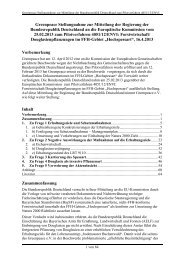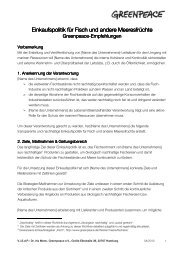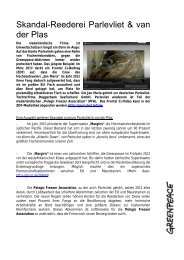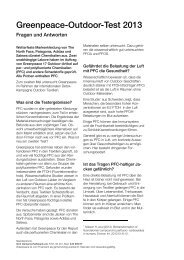SOLAR GENERATION - Greenpeace
SOLAR GENERATION - Greenpeace
SOLAR GENERATION - Greenpeace
Create successful ePaper yourself
Turn your PDF publications into a flip-book with our unique Google optimized e-Paper software.
FOREWORD<br />
The European Commission’s Directorate-General for Enterprise sees the photovoltaic industry<br />
as a key high-technology sector and has been a major contributor to the creation of a European<br />
Photovoltaic Technology Platform. This initiative will help secure the innovation, high<br />
investment and strong collaboration between research and industry required by the sector and<br />
also help take Europe closer to the Lisbon goal of becoming “the most competitive and dynamic<br />
knowledge-based economy in the world, capable of sustainable economic growth with more<br />
and better jobs and greater social cohesion”.<br />
Climate change is a key challenge that needs to be tackled by competitive eco-technologies. The<br />
European Union has played a leading role in defining the Kyoto Protocol. The forthcoming<br />
implementation of the emissions trading instrument will pave the way to greater use of<br />
renewable sources and to more rational use of energy. Photovoltaic technology, which converts<br />
the sun’s energy directly into electricity, will contribute to the reduction of emissions in the<br />
medium to long term, not only through cleaner projects in Europe, but also in developing<br />
countries through the transfer of technology.<br />
The sun provides more than 10,000 times the energy humanity consumes, meaning that there<br />
are few limits to the potential of photovoltaic technologies. For the last five years, the<br />
photovoltaic sector has experienced one of the highest growth rates worldwide (over 30% in<br />
2003) and for the 20 next years, the average production growth rate is estimated to be between<br />
27% and 34% annually. Currently the cost of electricity produced using photovoltaic technology<br />
is above that for traditional energy sources, but this will fall with technological progress and<br />
more efficient production processes.<br />
This EPIA / <strong>Greenpeace</strong> blueprint traces possible future developments in the photovoltaic sector<br />
over the coming decades, foreseeing significant benefits for the environment, but also for<br />
society: the photovoltaic sector might employ more than 2 million people by 2020.<br />
These developments will only occur if governments and the public at large welcome this<br />
technology. I am convinced this publication will promote this process and look forward to<br />
photovoltaic technology starting to play the role it deserves in establishing sustainable<br />
development for our benefit and that of future generations.<br />
Günter Verheugen<br />
European Commission Vice President,<br />
Commissioner for Enterprise and Industry<br />
3

















